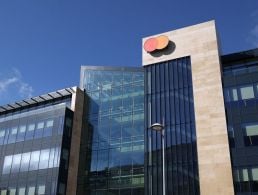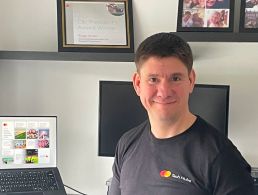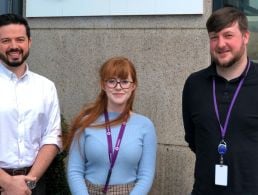Mastercard’s Chris O’Mahony explains why businesses need to take climate action seriously and how he’s bringing stakeholders on board with a new company initiative.
Taking corporate climate action is good for the environment and good for business, but getting your people on board with effecting positive change is a critical step. That’s something Mastercard’s Chris O’Mahony has been working on as part of the company’s Priceless Planet Coalition, a sustainability initiative launched last year that aims to plant 100m trees by 2025.
O’Mahony, who is Priceless Planet’s vice-president of product development, recently spoke to us about communicating the importance of climate action to internal and external stakeholders alike, as well as how businesses can begin to shape their own sustainability strategies and goals.
Mastercard achieved its goal of using renewable power for 100pc of its electricity last year, and has made further commitments to reach net zero emissions by 2050 and reduce first-use PVC plastic in card manufacturing.
“Climate change affects all of us and we recognise that the only way to address it is by working together,” O’Mahony said. “Priceless Planet Coalition is a platform designed to unite efforts and resources from a diverse collective of corporations, banks, merchants and other partners to accelerate positive impact on climate change.
“At Mastercard, we have incredible reach and a considerable network of partners. By utilising these, we can drive climate change engagement and awareness with our nearly 3bn consumer and corporate cardholders.”
An internal and external initiative
O’Mahony leads the initiative’s product definition and sustainability platforms. He spends a lot of his time defining product strategy and working with Mastercard’s engineers, but also with reforestation partners to define the programme’s monitoring and reporting requirements.
Another important element of his work is communicating the importance of climate action, and this is something he must do with Mastercard employees, partners and customers.
“As the name suggests, Priceless Planet Coalition is about all of us working together,” he said. “We understand that real climate action can only happen if we engage and enable our wider company in addition to our coalition of over 40 partners.
“Over the course of this year and beyond, we will be running a number of internal initiatives to engage and educate our employees on climate change. We also run a volunteering intake internally that enables employees to dedicate a number of hours a week to support our causes. Priceless Planet is a key beneficiary of this process by encouraging our own employees to get involved while spreading awareness of climate change.”
O’Mahony is particularly excited about getting external stakeholders on board, even if this may be challenging.
“The first element of this is our carbon calculator product. This product will provide consumers with real insight into the environmental impact of their purchases and the necessary tools and insights to take positive climate action.”
Crafting a corporate climate strategy
Why do tech companies need to take their sustainability strategies more seriously? O’Mahony referred to a recent survey from the United Nations Development Programme – the largest ever conducted on public opinion around the climate crisis. It found that almost two-thirds of people view the climate crisis as a global emergency.
“Technology companies – and other leaders in the private sector – understand that economic growth cannot come at the expense of the planet and that they can play an important role in driving change, both by addressing their own operations and footprint and using their technology and networks for social good,” O’Mahony said.
‘Economic growth cannot come at the expense of the planet’
– CHRIS O’MAHONY
In terms of Mastercard’s Priceless Planet initiative, he added that the company knew it had to partner with organisations that already had expertise in reforestation.
“Our partnership with both Conservation International and World Resources Institute help ensure we have the right proven scientific expertise and global resources to not only plant trees, but ultimately regrow forests. Our commitment is to not only plant 100m trees, but to evaluate and monitor their growth over five years to ensure they thrive and live up to their carbon impact potential.”
When it comes to setting targets, O’Mahony emphasised the importance of having “tangible milestones”.
“But you also need to look at the ‘how’. That approach has been crucial to the foundation of our coalition and is what I believe will ensure we have a meaningful impact on addressing climate change long term.”




